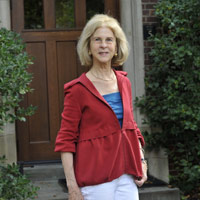
Elaine Pagels was a 38-year-old assistant professor at Barnard College when she received a MacArthur Fellowship in 1981, the first year of the program. Pagels is a historian of religion, with a focus on the origins of Christianity. She has examined how controversies over scriptural interpretation relate to certain social and political situations, such as the perception of women in Christian history. In her forthcoming book, Why Religion?: A Personal Story (Fall 2018), Pagels interweaves her personal story with an exploration of how religious traditions have shaped how we understand ourselves.
The Fellowship is awarded to extraordinarily talented and creative individuals as an investment in their potential. In 1981, it provided a no-strings-attached stipend ranging from $128,000 to $300,000, depending on the age of the recipient. The stipend has since been increased to $625,000 for all recipients. Journalists began to use the term "genius grant" as a shorthand reference for the Fellowship in the mid-1980s. To date, more than 1000 people have been named MacArthur Fellows.
How did you find out you were named a MacArthur Fellow?
EP: I had just come home from the hospital, where our one-year old son had open-heart surgery. I saw a message about a call from a Mr. MacArthur at some foundation. He said it was important. When I returned the call, Rod MacArthur said, "Congratulations." I said, "What for?"
What was your initial reaction?
EP: I was astonished. I was an untenured assistant professor at Barnard. None of my colleagues knew what I actually did. I had published a couple of monographs and a book, but everybody in academia publishes a book. I went back to the hospital where my husband was. We were so exhausted, it was like we were in an almost altered state of consciousness. When I told him what happened, he thought it might be a joke. But the next day, it was in the New York Times. Later, when we were all invited to Chicago and I met Rod MacArthur, he said, "I just wanted to know whether you people really existed." And I said, "That's what we wanted to know about you!"
How did the Fellowship impact your work and your career?
EP: It totally changed my life. The Fellowship was a godsend in two ways. First, it gave me time.
I was an assistant professor with no administrative support and a huge amount of teaching, going into work at 6 a.m., often staying until early evening. I was also acting chair of the department, even though I wasn't yet tenured. Besides feeling overwhelmed with work, we had a one-year old baby who needed a lot of care. My colleagues at Barnard were totally shocked when I was named a Fellow. They hadn't heard much about the Fellowship, but they were far more astonished because they didn't know who I was!
After we realized that this had happened, Barnard's president asked what I would like to do. I said I would like five years to do the work I love – research and writing – with no telephone to answer. So I had the time to write Adam, Eve, and the Serpent, and I could spend more time with our son.
Secondly, it gave me courage at a time when I was being massively attacked by some high-profile scholars. My first book, The Gnostic Gospels, got very mixed reviews. I got a ton of mail in response to the book; it was really overwhelming. I received letters from readers saying that the book changed so much for them and allowed them to understand a much more realistic account of how Christianity developed. Others wrote hate mail, charging that I was trying to destroy the church—even inspired by the devil. Even some of my professors had a divided response to the book; it caused quite an uproar.
The Fellowship is life-changing; I know of no others that are as generous and potentially transformative, especially for artists and people in the humanities. And it's especially precious when it goes to people who otherwise wouldn't have the time or capacity to do their work.
What has it been like to see the prominence of the Fellowship develop over the years?
EP: I love it--especially the diversity, the range of people doing different kinds of work—artists, filmmakers, musicians, scientists, along with people doing community projects and making a difference in society in very important ways. The range is just staggering.
What advice do you have for people about following their own creative path?
EP: Often people try to find the next cultural wave to ride or what they think will help them advance their careers. But the MacArthur Fellows are often people who are passionate about something they're exploring. I was exploring secret gospels! For all of us, though, the gift of a MacArthur Fellowship is an astonishing—and enormous--vote of confidence in favor of doing what you absolutely love. And meeting other people who do that, as we still do, is also an amazing gift!



